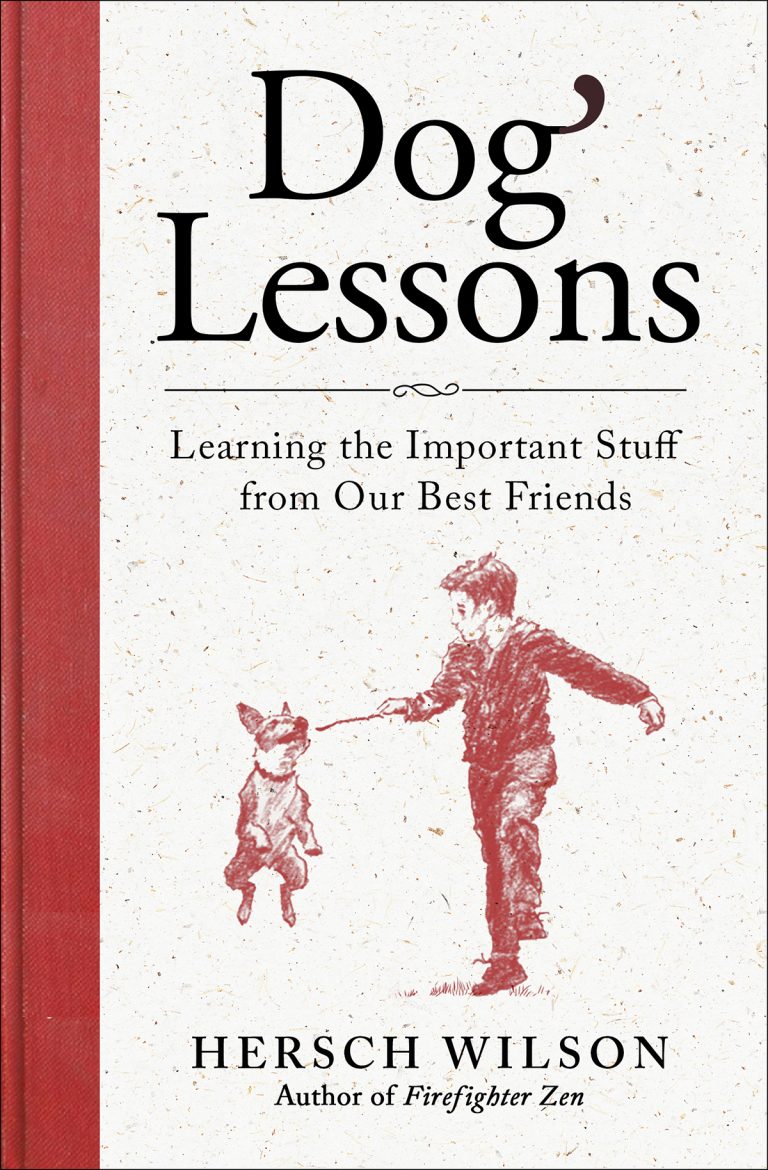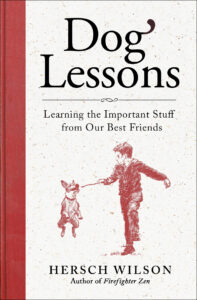
Hersch Wilson is the author of Dog Lessons and Firefighter Zen, an organizational consultant, pilot, former professional dancer, newspaper columnist, and volunteer firefighter. He lives in Santa Fe, New Mexico, with his wife, Laurie; two daughters; and two dogs, a Great Pyrenees and a Chihuahua-terrier mix.
In this world beset by crisis, why a book about dogs?
First, this beautiful line in the Talmud, “Do not be daunted by the enormity of the world’s grief. Do justly, now. Love mercy, now. Walk humbly now. You are not obligated to complete the world, but neither are you free to abandon it.”
In other words, even in times of soul-wrenching crisis, we have a role to play; we need to be part of the solution. Even though we often feel powerless, we’re not.
And at the same time, we crave companionship, community, and solace. Although that often means human companionship, our dogs can play a role: they greet us enthusiastically when we come home, whether from the store or a protest march. They sit on the couch with us with their heads on our laps. They mirror our emotional states. No matter what is going on “outside,” they just want to be with us. Having a dog present in our lives is a great gift, especially in times like ours.
You write that dogs can teach us lessons. What are some examples?
There are the obvious ones, like love and the sheer enthusiasm of going on a walk. And there are others. Dogs, for example, teach how not to get into a fight (most of the time). One of my favorites is their ability to be endlessly curious— even on the same walks we do every day. Then there is the love of wild spaces and their importance to our sense of being. Next is the desire to be free, even if, in our case, it means our Great Pyrenees, Toby, crashing through fences or screen doors. There is the importance of naps, something we seem averse to as busy 21st-century on-the-go humans. (continued)
I cover more in the book, but the last one I’ll leave you with here is old dogs teach us how to be old.
What does it mean to be a dog guardian? Why do you dislike the word “owner?”
“Owning” implies that I can do anything with the “object” I own. I can ignore it, take it for granted, and dispose of it if it tires me or I no longer have time. I believe deeply that we can’t “own” sentient beings. Sentient beings have moral standing. The philosopher Mary Ann Warren wrote, “If an entity has moral status, then we may not treat it in just any way we please.” “Guardian” implies that my job is to keep a dog safe and happy, protect them from harm, and respect their needs and wants.
How has being with dogs changed your view of the natural world?
First, dogs get me out in the natural world. They are excited to go on walks on our rural roads or hikes in the mountains. Second, once we let go of our preconceived notions of “dog,” it’s not a leap to understand that the natural world is full of sentience and hard-won evolutionary wisdom. The poet W.B. Yeats wrote, “The world is full of magical things patiently waiting for our senses to grow sharper.” Being with a dog in the wild wakes up our ability to sense the wild in a different and fuller way.
You write in the book that breeds aren’t good indicators of behavior. Can you explain?
Any dog’s behavior is a product (like human children) of their genetics and environment. On our road, we have an amazing Golden retriever, Cooper. He’s friendly and calm. Much of that comes from breeding. But also because he lives with a caring and kind guardian. If you put Cooper in an abusive environment, especially as a puppy, you’d get different behaviors. My brother has a rescue Pitbull named Baron. Who knows how he was treated early on? But Joey and Linda are kind and patient guardians. Baron has issues with other dogs but is friendly with humans and fun to be with. Always look at the individual dog, not just the breed. (continued)
What makes a dog aggressive?
Fear makes dogs aggressive. When you think of what we can control as guardians, if we contribute to an environment that creates fear, you’ll get an aggressive dog, for example, chaining a dog, where they can’t escape or find shelter. Relying on punishment (an ineffective training strategy anyway) where the dog is afraid of you — tucks her tail, ears flattened when you approach, will create aggression. Or cornering a dog, where they can’t escape, also will cause aggression. In my view, the key is to create a positive and trusting relationship.
What is your most important lesson from writing Dog Lessons?
After decades of being with dogs, I thought I knew a lot. Doing the research for this book changed my mind. The most important lesson I learned was about rescues. I believed the first few months of a dog’s life set in stone how they would “be” as a dog later, their behavior, like fear, resource guarding, barking, etc.
Doing the research, and the experience with our two current rescued dogs, Toby and Maisie, taught me that dogs are much more resilient. They can bounce back from tough “puppy hoods” to be friendly dogs. Well, Toby did. Maisie is part Chihuahua and is easily irritated. We’re still working on her; she’s a work in progress. But dog resilience is my number one lesson.
Why is it so hard to lose a dog? Is it okay to grieve the loss of a dog?
Because we’ve evolved. I grew up in a time and placed where it was common to put unwanted puppies in a sack and throw them in the river. Since then, I think collectively, we’ve come to understand that dogs are sentient beings. And they have feelings, like sadness and joy — acknowledging that would’ve gotten you excommunicated from most psychology departments as recent as thirty years ago.
And more simply, we love our dogs, and they love us. They have short but vibrant lives; they become part of our daily existence and routines.
It’s because we allow ourselves to love them that it is devastating when they pass away. And it is natural and healthy to grieve. No one should tell you otherwise, how to grieve, or “get over it.” It is a deeply personal experience.